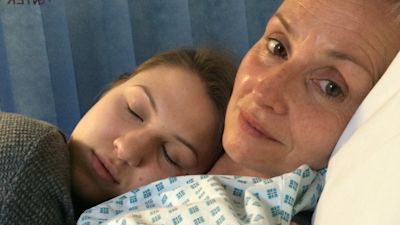Woman given six months to live survives 10 years after pancreatic cancer diagnosis

Watch Charlotte Gay's report
A woman from Cornwall says she does not feel special being part of the one percent of people who live 10 years beyond their diagnosed with pancreatic cancer.
Penny Lown from Maramchurch near Bude recently turned 60 after surviving what experts call the deadliest cancer because of its low survival rates.
A new study hopes to save more lives through earlier diagnoses by identifying a connection between those with diabetes being at higher risk of pancreatic cancer than those without the condition.
Penny says although she has so far survived 10 years on from her terminal diagnosis, she has fears for her family as her mother lost her husband when she was 50 years old and then had to watch her daughter be diagnosed.
"I do not want that to be my story," she said.
"I'm not going to watch my children be diagnosed because I know the majority of those people won't survive pancreatic cancer."
Penny says when she was diagnosed a decade ago she was told she would not live beyond six months.
"I just wanted to be ejected into the skylight and out," she said. "I just floated above myself.
"I must have gone into shock quite quickly. I actually heard a really weird noise next to me and it was my husband. He made a kind of wailing noise just because it was just sheer horror of it."
The former midwife was told a difficult course of chemotherapy could prolong her life but she shocked medics by being fit enough for surgery.
The operation saved her life and now she's part of a very small group of people who survive pancreatic cancer.
She says losing her father to the same condition and other early warning signs such as weight loss and a recent diagnosis of diabetes were not connected for a long time.
She said: "I felt unwell. Imagine if you're if you're a woman wearing a bra that's too tight and the pain felt like it was under the rib. People might not necessarily think that was something as sinister as pancreatic cancer. Especially in a woman myself who was fit and only 50 years old, they turned me away and said go and get antacid tablets, take time off work, get more rest and more and more time went by."
Every year in the UK, 10,500 people are diagnosed with pancreatic cancer and 90% of those people die before they can have any curative treatment.
In the largest study of its kind, the University of Surrey, in partnership with Pancreatic Cancer Action and the University of Oxford, found signs of pancreatic cancer - including weight loss, hyperglycemia and diabetes - and demonstrated the timelines for when they develop in relation to cancer.
This means if an algorithm tracking these symptoms could be developed, doctors could spot these signs of pancreatic cancer three years earlier which could save up to 3,000 lives every year.
Ali Stunt, founder of Pancreatic Cancer Action and a survivor herself, says she is concerned the recent pressures on GPs mean patients are less likely to be diagnosed before they can be treated for their cancer.
She said: "We know that our patients have seen a GP at least four or five times before they get referred because some of their symptoms seem to be non-specific, that the GP during the triage over the telephone is not considering them to be serious enough to warrant a face to face appointment."
Currently pancreatic cancer only receives only 3% of available cancer research funding which the charity says correlates with low survival rates.